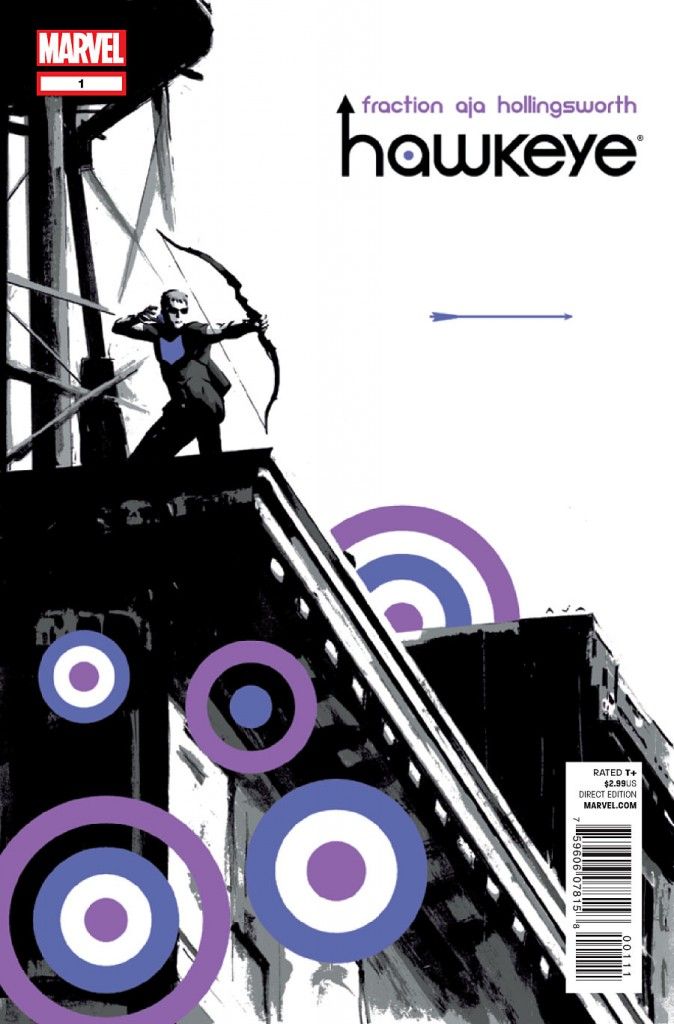Every year, the Eisner Awards present a snapshot of the most significant comic books released in print and online. In 2013, the Oscars of Comics reflect a shift with the level of diversity possibly unprecedented in American comics.
As has been noted, Tuesday's Eisner nominations have a remarkable number of nods to literary comics house Fantagraphics and creator-owned comics publisher Image, and a scarcity for Marvel and DC Comics, despite their majority hold on market share. The dominant genre of that same market has long been superheroes, but for the first time, there are hardly any superhero comics recognized by the Eisner judges. The notable exception is Marvel's Hawkeye, which is tied with two other non-superhero books for most nominations. Despite Hawkeye's strong showing, the majority of nominated works are in the genres of drama, slice-of-life, humor and non-fiction, with a decent percentage of adventure, crime, fantasy and science fiction.
Hawkeye isn't the only superhero title among the nominees: Chris Samnee's work on Daredevil and The Rocketeer: Cargo of Doom earned him a Best Penciler/Inker nod. J.H. Williams III and Dave Stewart were nominated for Best Cover Artist and Coloring, respectively, for what they created in Batwoman, although Stewart's is also for six other non-superhero books. Finally, Paul Grist was nominated for Best Lettering for Mudman, and IDW Publishing's Daredevil Born Again: Artist's Edition was nominated for Best Archival Collection and Best Design. So all told, there are only about a half dozen superhero comics that are Eisner-worthy enough to stand out from the pack.
Compare that to last year, when Daredevil, Ultimate Spider-Man, Flashpoint: Batman — Knight of Vengeance and The All-New Batman: The Brave and the Bold were all up for major awards (Best Single Issue, Best Continuing Series, Best Limited Series or Best Publication for Kids). Plus creators like Jeff Lemire, Mark Waid, Mike Allred, Chris Samnee (again), Marcos Martin, Paolo Rivera and Joe Rivera, Francesco Francavilla, and Tom Orzechowski all got nominations almost entirely for superhero comics, and in some cases multiple superhero comics. In total there were about 16 titles nominated in 2012 on some level. There were about 15 superhero comics nominated in 2011, and more than 20 in 2010. This year had six.
Where did all of those excellent superhero comics go? To be fair, there are some omissions. After all, what fun are awards and nominations, if you can't complain about those robbed of accolades? The digital comics category, which sorely needs to be expanded to two or three categories, would've done well to recognize the innovation and experimentation by Waid, first with Stuart Immonen on Avengers vs. X-Men: Infinite #1 (starring Nova) and then with Peter Krause on Insufferable (or for a non-superhero title, with Jeremy Rock on Luther). And for print, you could do a lot worse than Scott Snyder and Greg Capullo's Batman. Those are just the first that popped into my head, but there's no denying that superheroes have some stiff competition these days and I'm happy to see such creative vitality and diversity.
As has been said, this is an exciting time for comics. There are more kids comics in decades (those three Best Publication for Kids categories are packed with excellent material), and there are more genres with high-quality comics than ever before. In so many areas, comics are not only coming into their own but excelling. The Eisner judges see it too, and instead of nominating what sells the most, they nominate for quality. Obviously that is a subjective thing, but whoever picks the judges has generally had an ear to the ground on fan response and a good sense of critical consensus. They're not perfect, and they can only nominate so many comics in each category, but I think if you were to use every list of Eisner nominations going back to 1985 as a reading list, I think you'd not only have a very accurate time capsule of the comics scene for each year, you'd also really enjoy yourself more times than not.
Existing in a vacuum, this year's dearth of superhero comics would mean absolutely nothing. However, it's difficult to argue the industry is not in a state of flux: digital comics, increasing sales amidst increasing financial hardship for creators who are struggling to monetize their work, the recurring stories of discontent creators at Marvel and DC, the grassroots push of creator-owned comics, the advent of crowd-sourced publishing. In another sign of the times, the Eisner Awards nominated at least two Kickstarter campaigns this year.
So what happened? Did Marvel and DC, and the superhero genre in general, just have an off year? Are Marvel and DC getting lazy after years upon years of ruling the roost? Are superhero comics not keeping up with the increasing growth and quality of other genres? Is the rest of the industry leaving Marvel and DC behind in being leaders in creative and innovative comics? Are movies and TV finally doing superheroes better than comics? Or did the Eisners just have stuffy superhero-hating judges this year? The jury is still out on whether awards have any increase on sales, so these are challenging questions that probably won't even be asked with sales going well enough. Obviously they're being enjoyed or at least purchased, which is essentially the same thing when you get right down to the basics of capitalism and supply and demand economics. Maybe that's OK. Maybe it's helping diversify readership as well as what's out there to read. There are good superhero comics. There just aren't enough truly great superhero comics.


